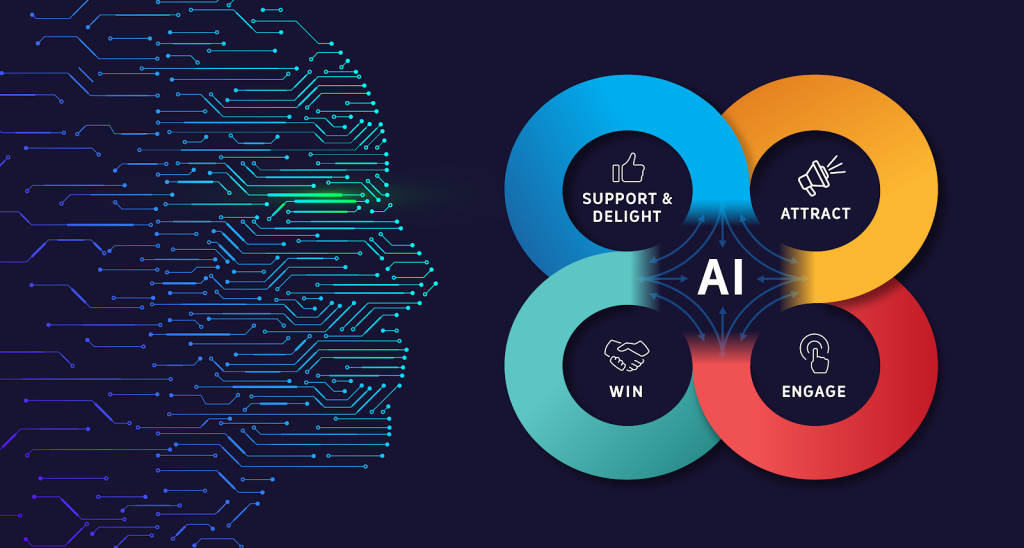
Introduction
In today’s technologically-driven era, there’s a paradigm shift taking place in how businesses approach sales and marketing. Artificial Intelligence (AI) is no longer a term reserved for big-budget corporations or futuristic movies. It’s a reality for businesses of all sizes, especially small ones. AI, through its sophisticated algorithms and predictive analyses, is paving the way for unprecedented advancements. But how exactly is this sophisticated technology elevating sales and marketing tactics, especially for small businesses? Let’s delve into the transformative power of AI.
1. Personalization: Tailored Experiences for Each Customer
Personalization is the key to making every customer feel special, and AI plays a pivotal role in achieving this feat. By analyzing purchasing patterns, browsing history, and other user behaviors, AI can predict what a customer might want before they even know it. This level of foresight ensures that businesses can present tailored offers and content, making customers feel understood and valued.
According to Salesforce, 62% of consumers expect companies to adapt offers to their needs and preferences. Small businesses leveraging AI-powered tools can meet these expectations, thereby setting themselves apart from competitors.
2. Chatbots: AI-Powered Virtual Agents Improve Customer Satisfaction
One of the significant challenges small businesses face is resource constraints. Employing a 24/7 customer support team can be a costly affair. Enter chatbots – AI-driven virtual assistants that can handle queries, resolve issues, and even facilitate sales.
For those keen to improve customer satisfaction with AI, these virtual agents offer an affordable yet effective solution. They’re programmed to provide instant responses, ensuring that customers aren’t left waiting. These bots can also handle multiple queries simultaneously, making them a boon for resource-strapped small enterprises.
3. Data Analysis: Uncovering Hidden Insights
At the heart of AI’s power lies its ability to process and interpret vast amounts of data at breakneck speeds. For small businesses, this means transforming raw data into actionable insights.
By analyzing customer data, AI can identify trends, buying behaviors, and potential areas of growth. Such insights enable businesses to refine their strategies, ensuring they’re always a step ahead of market demands. A study by McKinsey & Company suggests that businesses using AI-driven analytics have a 19% increase in profitability compared to their non-AI counterparts.
4. Predictive Marketing: Foreseeing Customer Needs
Imagine knowing what your customer wants before they do. Predictive marketing, powered by AI, makes this possible. By analyzing previous transactions, online interactions, and other relevant data, AI can anticipate future buying behaviors.
This prescience is invaluable for small businesses. They can stock up on products that are predicted to be in demand, roll out timely marketing campaigns, or even introduce new offerings aligned with predicted trends. Harvard Business Review states that predictive marketing can increase sales by up to 20%.
5. Content Optimization: Crafting the Perfect Message with AI Prompts
Every brand has a story to tell, but communicating it effectively requires impeccable content. With the help of AI prompts, businesses can craft content that resonates with their target audience. Whether it’s email campaigns, social media posts, or website content, AI can suggest optimizations making every word count. By ensuring relevance and engagement, these prompts can significantly amplify marketing efforts, especially for small businesses with limited content creation resources.
6. Enhancing Email Campaigns: Beyond the Basic Newsletter
AI isn’t just about big data; it’s about leveraging data effectively. This stands true especially for email campaigns. Remember those times when businesses would send a standard newsletter to their entire mailing list? Those days are long gone. Today, AI algorithms analyze user interactions with emails, segmenting the audience based on preferences, engagement history, and other criteria. This allows businesses to craft hyper-personalized email campaigns. Campaign Monitor reports that segmented campaigns drive a 760% increase in revenue. For small businesses, this level of precision is a game-changer.
7. Visual Recognition: Revolutionizing Product Discovery
The retail world is being transformed with AI’s capability to recognize and categorize visual content. Imagine uploading a picture of a dress you like and instantly getting recommendations for similar products or matching accessories. This visual search functionality, powered by AI, is making waves in e-commerce, allowing businesses to offer a seamless and interactive shopping experience. Companies like Pinterest are already leveraging this technology, enabling users to search with images instead of words.
8. Social Media Analytics: Deciphering Digital Sentiments
Social media is more than just a platform for sharing updates. For businesses, it’s a gold mine of customer insights. With AI-driven analytics tools, companies can now monitor brand mentions, sentiments, and emerging trends in real-time. These insights provide businesses with an understanding of their brand’s perception and areas where they can improve. Platforms like Brandwatch use AI to monitor millions of online conversations, giving businesses a clearer picture of their digital footprint.
9. Dynamic Pricing: Getting the Price Right
Dynamic pricing isn’t new. However, AI takes it to a whole new level by analyzing multiple variables in real-time, from stock levels to competitor pricing and demand fluctuations. With such insights, businesses can adjust their prices to maximize profits or move stock quickly. For small enterprises, where margins can be tight, this AI-driven pricing strategy can make a substantial difference. Companies like Uber employ dynamic pricing, adjusting ride prices based on real-time demand.
10. AI in Advertising: Targeting Beyond Demographics
Advertising has historically been a game of numbers, but with AI, it’s becoming a game of precision. Traditional methods relied heavily on broad demographic data. Today, AI algorithms analyze individual behaviors, preferences, and even micro-moments to deliver ads that are not only relevant but also timely. This granular approach ensures a higher Return on Advertising Spend (ROAS). Platforms like Facebook and Google Ads utilize AI to optimize ad delivery, ensuring businesses get the best bang for their buck.
Conclusion
The power of AI in sales and marketing is undeniable. From offering personalized experiences to optimizing content, predicting market trends, and revolutionizing advertising, AI is a force to be reckoned with. Small businesses, often perceived as underdogs, are now equipped with tools that level the playing field. By embracing AI, they not only optimize their strategies but also offer unparalleled value to their customers. In this evolving digital landscape, the fusion of AI and innovative sales and marketing tactics is not just a trend; it’s the future. And for small businesses, the future looks promising.
Tony is an AI consultant with expertise in e-commerce and business automation. Combining his engineering background with business insights, he adeptly identifies challenges and crafts tailored AI solutions for optimal efficiency.
